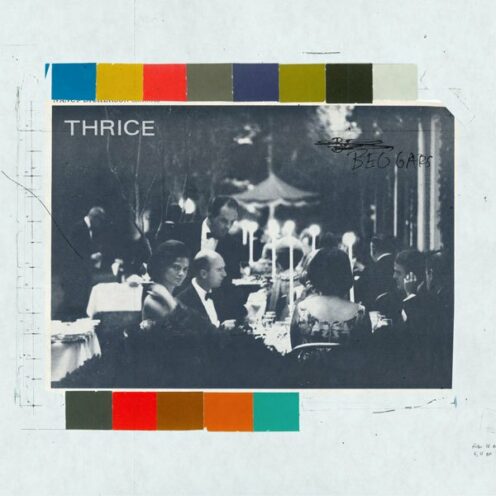
The praise and allure surrounding the seventh studio album from Thrice is one that I initially didn’t fully grasp at my first listen, nearly ten years ago to the day. Maybe I was in a bad mood that day or was distracted during my listening experience, because as I revisit Beggars now, I can’t fathom how I would have felt anything but pure astonishment and wide-eyed wonder at this pre-hiatus masterpiece by the California rockers. Beggars was released digitally a full month before the physical release date of September 15th, 2009, which gave eager fans a chance to absorb the new sounds from Thrice before rushing out to their local record store the month after. From songs as immediately gratifying as “All the World is Mad” to the progressive-rock elements of “Circles,” Beggars had a little bit of everything from all phases of Thrice’s expansive discography. The self-produced record (with a specific and well-deserved credit to lead guitarist Teppei Teranishi) is a wonderful snapshot of what the band was capable of making when firing on all cylinders.
A look back at this record brings back many emotions for me from hearing these songs live as recently as their spring tour, and now that I have the foresight of seeing where Thrice would eventually take their sound, one can’t help but praise this album as being one of their best.
The LP starts with the blazing guitar work of Dustin Kensrue and Teranishi on “All The World is Mad,” all worked around the underrated bass line of Eddie Breckenridge. The track ending up being the lead single from the record, and works as a solid introduction to the type of songwriting that comes forth in Beggars. The bridge of the song also features some of my favorite Kensrue lyrics of all time with, “Oh little light we have! / It only serves to show / The snares and seeds of wrath / We have already sewn on every path.”
“The Weight” turns the page on the great opener with some even more impressive guitar riffs and intricate drumming from Riley Breckenridge to help the song keep the groove. The song is now a staple in their live shows, and with tracks like this in their discography, ones that most bands would sell their soul for, it’s no wonder why Thrice is still in high-demand whenever they tour.
“Circles” brings the pace down to a mid-tempo level, and instead broods, rather than rocks. The restrained vocals from Kensrue were beautifully recorded and mixed by Dave Schiffman. Kensrue has the option to belt out his vocals at several points during the album, but his overall control and power in breathy vocals such as the ones found here are all equally as impressive.
My personal favorite from the record, “Doublespeak” features some well-placed piano courtesy of Teranishi and his powerful chords help drive home every lyric from Kensrue. An essential line in the song is, “I don’t wanna know who really pulls the strings, / Just as long as it’s not you or me.” This particular lyric stuck with me for quite some time and made me think of all the context going on around the world at this time.
“In Exile” is another slow-building type of song that has remained a band and crowd favorite over the years. The song outlines a journeyman of sorts figuring out where his place is both physically as well as mentally. Kensrue sets the scene quite well in the third verse, “I am a pilgrim – a voyager; / I won’t rest until my lips touch the shore / Of the land that I’ve been longing for as long as I’ve lived/ Where there’ll be no pain or tears anymore.” It fits quite well in both the sequencing of the record as well as the album artwork itself. To sandwich this song into the main meat of the album was a great choice by Thrice here.
While the middle of the record tends to get more introspective, it’s clear that Thrice felt the need for variety on songs such as “At The Last.” The fast-paced introduction and choruses make for one of the better pure rock and roll songs on the LP, and it just goes to show the beauty of having such an expansive repertoire of songs on the album. On the storytelling songs such as “Wood & Wire,” Kensrue began to impress me even more as an artist/lyricist. For example, the opening lines of: “14 years behind these bars / In 12-foot square of cold cement /I’ve lost nearly everything / For a crime of which I’m innocent / But all my suffering’s a light and momentary pain / While the weight of an endless glory still remains to me” come across as powerful as ever, as we see our criminal justice reform system continue to be a joke to the world as we know it.
The other songs that round out the record, such as the hauntingly beautiful “The Great Exchange” only continue to do more justice to the legacy that Thrice have created for themselves. This record tended to give Kensrue a lot of the praise, which is justified, but I feel like Teranishi was the MVP, of sorts. From getting a specific producer credit to playing multiple instruments, he deserves a lot of credit for the success and allure of Beggars.
The album closes with the title track, and it continues to unfold the story that Kensrue and his bandmates really saw through from beginning to end. Kensrue raises a lot of loaded questions in lyrics such as the closing notes where he sings , “Can you hear what’s been said? / Can you see now that everything’s grace after all? / If there’s one thing I know in this life: we are beggars all.” What a beautifully tragic way to end a nearly flawless record.